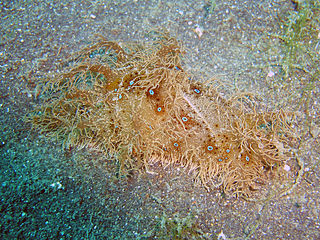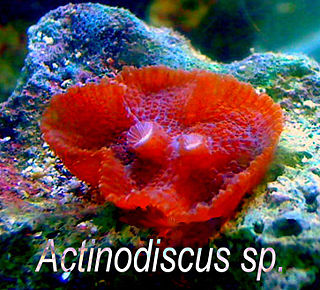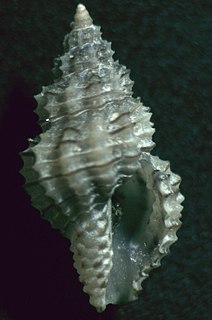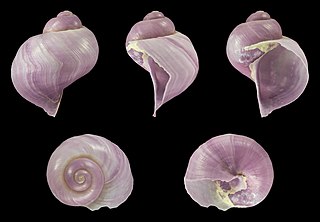
Bursatella leachii, common name the ragged sea hare or shaggy sea hare, is a species of large sea slug or sea hare, a marine gastropod mollusk in the family Aplysiidae, the sea hares. Previously thought to be a single worldwide species it is now known to be a species complex.
Gérard Paul Deshayes was a French geologist and conchologist.

Bursatella is a genus of sea slugs or sea hares, marine opisthobranch gastropod mollusks in the family Aplysiidae, the sea hares.

The Pleurobranchidae are a taxonomic family of sea slugs, marine gastropod molluscs in the clade Pleurobranchomorpha.

Steromphala cineraria is a species of small sea snail, a marine gastropod mollusc in the family Trochidae, the top snails.

Discosoma is a genus of cnidarians in the order Corallimorpharia. Common names for the genus include mushroom anemone, disc anemone and elephant ear mushroom.

Mangelia unifasciata is a species of sea snail, a marine gastropod mollusk in the family Mangeliidae.

Onchidella celtica is a species of air-breathing sea slug, a shell-less marine pulmonate gastropod mollusk in the family Onchidiidae.
Raphitoma cordieri is a species of sea snail, a marine gastropod mollusk in the family Raphitomidae.

Cyrillia linearis is a species of sea snail, a marine gastropod mollusk in the family Raphitomidae.

Jujubinus exasperatus, the Rough Top Shell, is a species of sea snail, a marine gastropod mollusk in the family Trochidae, the top snails.

Phorcus richardi is a species of sea snail, a marine gastropod mollusk in the family Trochidae, the top snails.

Trochus nigropunctatus, common name the black-spotted topshell, is a species of sea snail, a marine gastropod mollusk in the family Trochidae, the top snails.

Janthina globosa is a species of holoplanktonic sea snail, a marine gastropod mollusk in the family Epitoniidae, the violet snails or purple storm snails.

Euspira guilleminii is a species of predatory sea snail, a marine gastropod mollusk in the family Naticidae, the moon snails.
Coriocella safagae is a species of small sea snail with a transparent internal shell, a marine gastropod mollusk in the family Velutinidae. Because the shell is mostly internal, the snail resembles a sea slug in general appearance.

Cumia reticulata, common name the false triton, is a species of sea snail, a marine gastropod mollusk in the family Colubrariidae. Out of this family, there are at least 6 species that are known to feed on blood. This trait of feeding on blood is likely shared by the entire family.
The year 1804 in birding and ornithology.
Tectibranchia Cuvier, 1814, also spelled as Tectibranchiata, was previously used as a taxonomic order, or suborder, of gastropods in which the gills are usually situated on one side of the back, and protected by a fold of the mantle. When there is a shell, it is usually thin and delicate and often rudimentary.

Coriocella nigra is a species of sea snail, a marine gastropod mollusk in the family Velutinidae. An Indo-Pacific species, it lives on rocks at depths of up to 15 m. It is up to 10 cm long and has an internal shell; body color is black or brown. C. nigra is probably a predator of tunicates.














